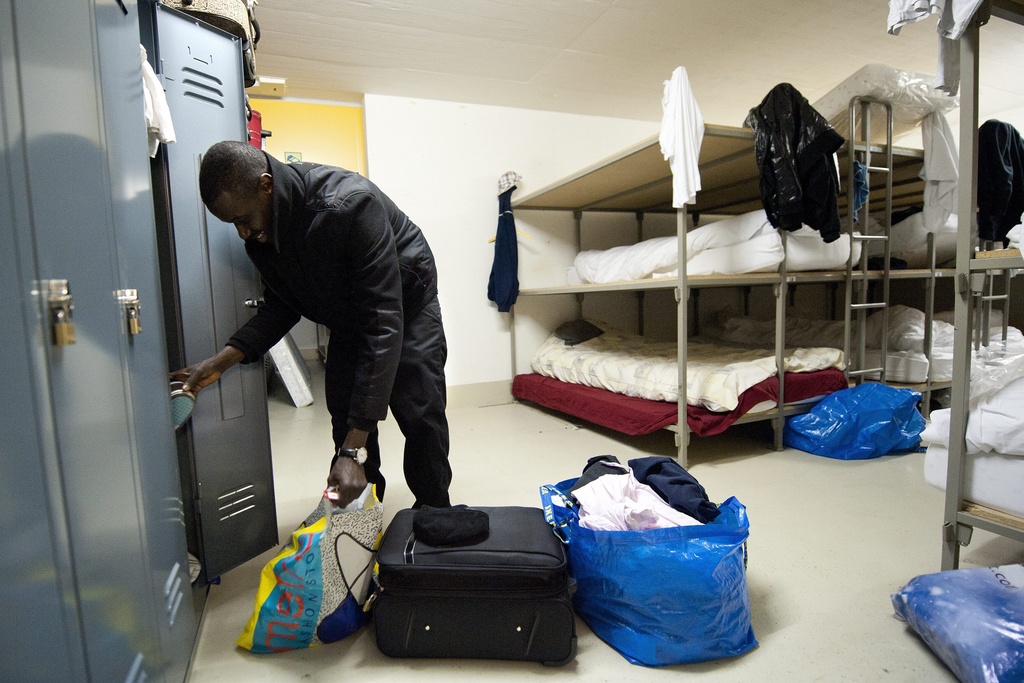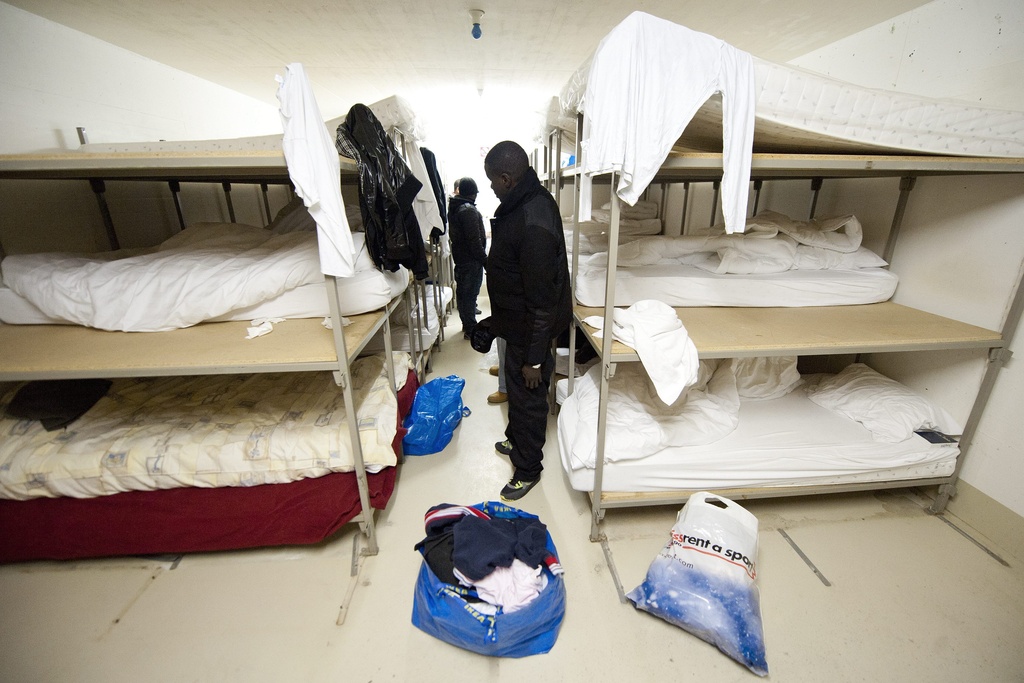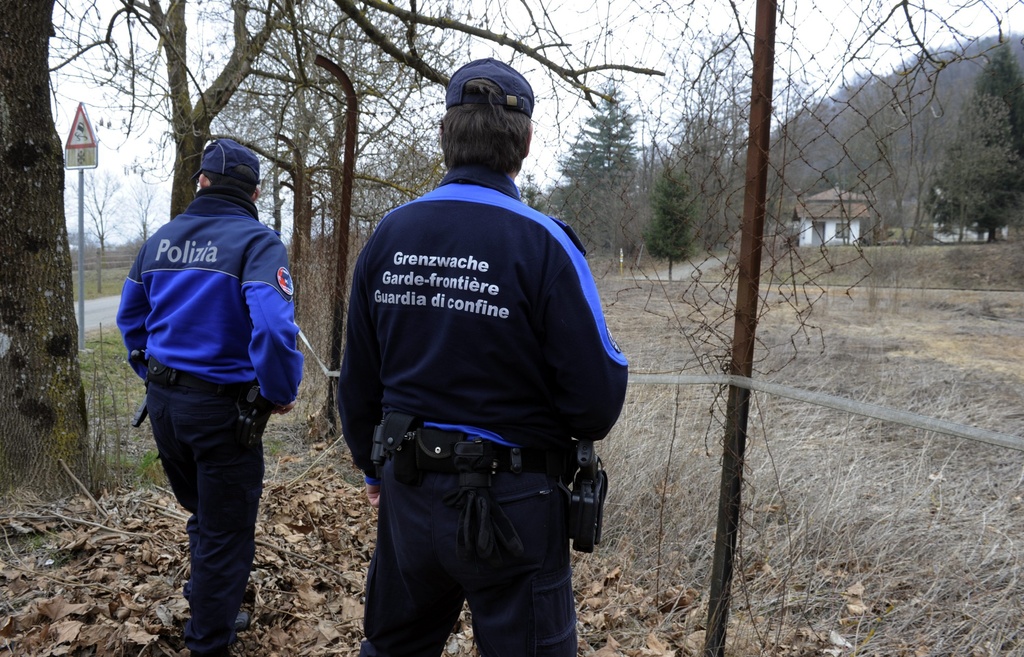Minister seeks to speed up asylum procedure

Justice Minister Simonetta Sommaruga’s plans to shorten deadlines for asylum requests and give the federal authorities a greater say have met with mixed reaction.
A parliamentary committee and a refugee group have come out in favour of the latest proposal, but the rightwing Swiss People’s Party said it was ineffectual and the media seems unconvinced.
Following a meeting with a Senate committee on Monday, which unanimously approved the measures, Sommaruga said the aim was to process most asylum applications within 120 days. The remainder should not require more than 12 months for a final decision.
In an initial phase, applicants would be housed in centres run by the federal authorities instead of in accommodation in the cantons, as is currently the case.
“We need the cooperation of the cantons,” Sommaruga pointed out, adding that the current system was too complex.
She also proposed boosting the legal protection of asylum seekers, but rejected calls to tighten the asylum law or to set up internment camps.
The reform could take up to five years before it is implemented, but the government already faces demands by parliament to present by autumn a list of asylum proposals which could be implemented at short notice.
Reactions
In a first reaction, the People’s Party accused Sommaruga and the Senate of procrastinating.
“Sommaruga has focused on new and costly structures instead of speeding up the procedure with simple and swift measures,” a party statement said.
The other main political parties have yet to react.
However, the non-governmental Refugee Council welcomed the minister’s proposals as justified and fair.
“Everybody involved will benefit,” a statement said, adding that this included refugees, rejected applicants and the state, which could cut spending because of a shortened procedure.
“It will ultimately improve the credibility of the asylum system,” it said.
The president of the 26 cantonal justice and police authorities, Karin Keller-Sutter, said the proposals were in line with longstanding demands by the cantons.
“I hope this time the proposals will be implemented,” she told public television.
The cantons, which are in charge of asylum matters, and the federal authorities have repeatedly been at odds over housing for asylum seekers.
History of reforms
The proposed reform is the latest in a series over the past three decades and is not directly linked to concerns about a growing number of asylum requests from countries in North Africa.
In 2002 the government proposed a tightening of asylum regulations which was finally endorsed by voters in a nationwide ballot in 2006.
The law allows for the rejection of asylum seekers who fail to produce valid travel and identification documents within 48 hours, as well as for those who refuse to leave the country to be jailed for up to two years pending deportation. Rejected applicants also lose the right to social security benefits and can only receive emergency aid.
Sommaruga’s predecessors took further steps. Christoph Blocher, a pillar of the People’s Party, ordered a reduction in personnel and shelters based on the assumption that Switzerland would process not more than 12,000 requests per year. In reality the backlog of asylum requests increased amid a dispute over cantons not making enough housing available for asylum seekers.
Three years ago Eveline-Widmer-Schlumpf mooted plans to cut asylum numbers by excluding applications at Swiss embassies or by not allowing certain requests, such as from Eritreans who refused to serve in their country’s army.
The reform was thrown out by a parliamentary committee last year.
Scepticism
Tuesday’s newspapers showed guarded scepticism about the latest plans.
The mass circulation Blick had praise and criticism for Sommaruga, saying she made a “step forward – and a step backwards”. But it believed that increased legal protection would be a factor in encouraging asylum seekers to try their luck in Switzerland.
The syndicated Der Bund and Tages-Anzeiger editorial said the reform was “irresistible – at least on paper”. It cautioned against false hopes that the number of asylum seekers would drop as a result of the proposed reform.
“[Rejected] asylum seekers will continue to go underground and refuse to return to their home countries even under custody of the federal authorities,” it warned.
The Berner Zeitung concluded that the reform looked good at first sight, but raised serious questions about its practical use.
From January to March 2011, 4,371 people applied for asylum in Switzerland – an 18% rise on the same period in 2010.
Most were filed by Eritreans (724 in all, up 35% on 2010), Nigerians (428, down 32%) and Tunisians (251, up 77%).
In March alone, there were 1,874 requests, a third more than in March 2010.
The Swiss justice ministry has said that Switzerland could offer protection to refugees fleeing the fighting in Libya but that Tunisian economic refugees would be sent home.
A first reform of the law came into force in 1984 allowing the authorities to reject requests as unfounded.
As of 1988 asylum seekers lost the automatic right to work and the authorities were given the right to detain rejected asylum seekers.
In the 1990s restraining measures against rejected asylum seekers were extended, as were the list of reasons to reject requests as unfounded.
Over the past ten years approval of applications has been made more difficult, appeal deadlines shortened, welfare payments cut and detention periods extended.
In 2006 voters approved a plan to consider asylum only for those with valid travel documents and introducing harsher restraining measures.
Source: Swiss Refugee Council

In compliance with the JTI standards
More: SWI swissinfo.ch certified by the Journalism Trust Initiative






You can find an overview of ongoing debates with our journalists here. Please join us!
If you want to start a conversation about a topic raised in this article or want to report factual errors, email us at english@swissinfo.ch.